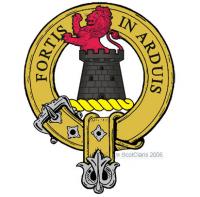
Clan Middleton
The name Middleton is believed to derive from the lands of Middleton of Conveth, which are near Laurencekirk in Kincardineshire. These lands are confirmed by a charter of William the Lion. In 1221 Umfridus de Midilton witnessed the granting of land to the Abbey of Arbroath.
The name of Humfrey de Middleton appears on the Ragman Roll of 1296, also Robert de Middleton was imprisoned at Dunbar Castle during that year.
The family was known as "of Middleton of that Ilk" for about three hundred years, until John Middleton was created 1st Earl in 1656 by Charles II.
John Middleton was a professional soldier who joined Hepburns regiment, serving the King of France. In 1642 he returned to Scotland, joined the Covenanters, and was second in command at the Battle of Philiphaugh in 1645. In 1646 he was made Commander-in-Chief and later the same year negotiated the final terms of Montrose's surrender.
In 1651 he was major-general at the Battle of Worcester, fighting for Charles II. He was captured after being wounded, but managed to escape, and joined Charles II in exile in Paris. He remained in Charles's service until the Restoration, when he was made 1st Earl of Middleton, being appointed to a number of important offices in Scotland. He subsequently lost these offices in 1663 after clashing with the Earl of Lauderdale. After serving as governor of Rochester and Lieutenant-General of the Kent militia, he was made governor of Tangier in 1668, until his death in 1674.
John Middleton's son was Charles Middleton, second and last Earl of Middleton. He served as Secretary of State for Scotland and was also Ambassador to the imperial court in Vienna. He was later imprisoned in England when he refused to recognise the revolution of 1688 and accession of William and Queen Mary, although he managed to escape. The title of Earl was forfeited after Charles's sons were captured attemting to invade Scotland with the assistance of French troops.
Sir Thomas Middleton of Rosefarm in Cromarty was deputy director general of the Department of Food Production during WWI, and was made a Fellow of the Royal Society in 1936.








